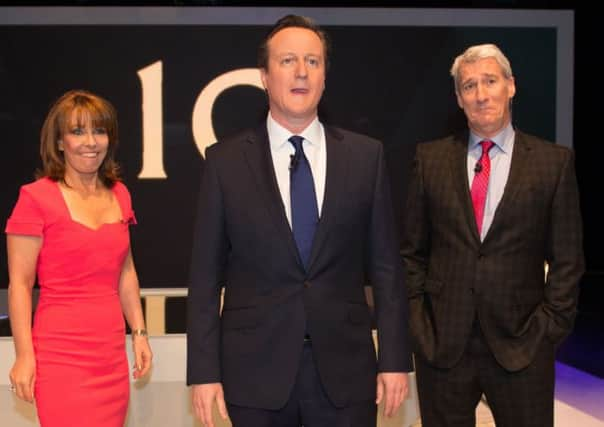Tom Richmond: Questions to be answered in the real battle for No 10


He will do so with far more confidence than on the tumultuous night of May 11, 2010, when he was finally asked – after five days of uncertainty – to form Britain’s first post-war coalition once Gordon Brown had been evicted from No 10. Few expected the Tories and Lib Dems to stay in office for the full five years.
However they did so and history is likely to be far kinder to the coalition’s overall record than current critiques. Despite this, politics per se remains at the lowest of ebbs – despite the good intentions of Mr Cameron and Nick Clegg, his unfairly maligned Lib Dem deputy.
Advertisement
Hide AdAdvertisement
Hide AdWestminster has still not recovered from the expenses scandal, one reason why the traditional party system is so fragmented. Every scandal over probity only served to strengthen the public’s perception that all politicians are on the make. They’re not.
Meanwhile former Batley and Spen MP Elizabeth Peacock wrote in The Yorkshire Post last week that she was already ‘bored’ by the campaign. She’s not the only one – many acquaintances say they feel ignored because of the infuriating tendency of politicians to argue with each other, and belittle opposing policies, rather than talking to the country.
Thursday’s Battle for Number 10 television exchanges did not help – former Newsnight presenter Jeremy Paxman allowed his antagonistic ways to stand in the way of more substantive policy matters. Elections are not game shows.
Just how can the public and politicians become more engaged? With less than six weeks to go until the votes are counted, here are five priorities that the main parties need to address as they strive to win over the uncommitted and remind voters of the onerous importance of their own role – electing MPs to the 56th Parliament.
Advertisement
Hide AdAdvertisement
Hide Ad1. Answer the question. David Cameron wrong footed Ed Miliband at the final Prime Minister’s Questions when said “straight questions deserve straight answers” before ruling out a post-election increase in VAT. Yet, minutes later, the Tory leader responded to the Labour leader’s question on immigration levels by suggesting that the Opposition intend to impose ‘a jobs tax’ by raising National Insurance contributions. He also looked weak in his Paxman exchanges when he did not know how much extra money Britain had borrowed since 2010.
2. The debate dilemma. When the leaders of Britain’s seven main parties go head-to-head on Thursday, they will have a dilemma – should they be magnanimous like the ‘I agree with Nick’ exchanges of 2010 which propelled the Lib Dem leader into government or should they go on the attack? Humility is also important but TV viewers will not be forgiving if the debate degenerates into farce because of leaders talking over each other.
3. Manifesto launches. The main parties must reveal the financial costs – and how eyecatching policies will be funded. Excuses should not be tolerated, the independent Office of Budget Responsibility has set out the parameters for the public finances. If these are good enough for the Budget, they should be perfectly acceptable for a manifesto. Those policies that will be sacrosanct in the event of a coalition should also be made clear – this is where Nick Clegg erred in 2010 over university tuition fees. He didn’t state to students that his pledge was open to compromise.
4. Spare us the families. This election is not about which leader has the most kitchens – or whose family looks the most photogenic on the school run after Mr Miliband wheeled out his two young children to be props in images filmed by ITN. I don’t want to know the breakfast habits of the main leaders – or the PM’s views on Jeremy Clarkson’s Top Gear ruckus. This election should not be about politicians ingratiating themselves with celebrities – it’s about the future governance of this country.
Advertisement
Hide AdAdvertisement
Hide Ad5. Foreign policy does matter. Though domestic issues will dominate, this is a world made even more uncertain by the ruthless advance of the Islamic State, Russia’s belligerence under Vladimir Putin and the UK deploying two additional RAF Chinook helicopters to bolster the defences of the Falklands. Not only would the Britain of today be unable to match the stirring deeds of 1982 when the South Atlantic islands were liberated from Argentine invaders, but the Defence Select Committee – headed by the widely-respected former diplomat Rory Stewart – says Britain needs to maintain defence spending at the Nato target of two per cent in order to deter this country’s enemies. Is this necessary, affordable and justifiable?
These are just five issues but they should not be overlooked. For, if politicians cannot engage with the matters exercising voters on the eve of a knife-edge General Election, what hope is there for this country and Westminster’s reputation as one of the world’s bastions of democracy?